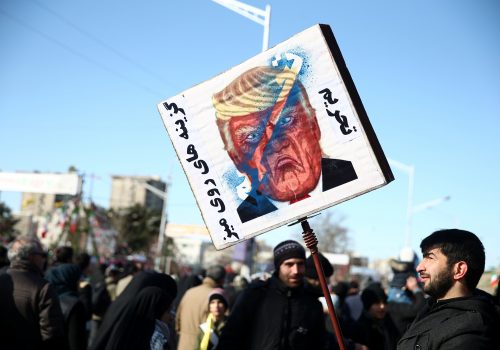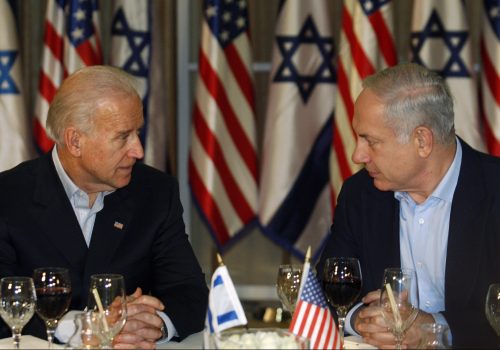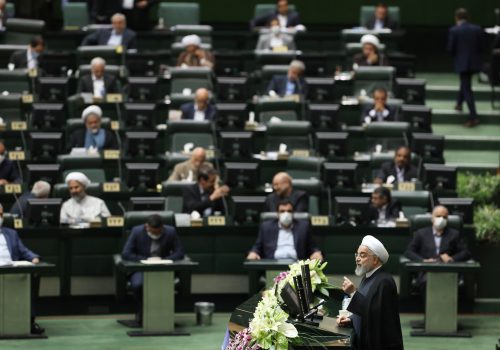Do Iranians really care who wins the US election?
Although polling is an inexact science, particularly in Iran, it still gives us a glimpse into Iranian opinion. According to a poll conducted by the Iranian Students Polling Association (ISPA), prior to the 2016 US presidential election, 52 percent of Iranians believed that it made no difference for Iran whether Donald Trump or Hillary Clinton won.
In hindsight, the majority was wrong. In 2018, President Donald Trump withdrew from the Joint Comprehensive Plan of Action (JCPOA) and began a “maximum pressure campaign” against Iran. This campaign included sweeping sanctions that have crippled the Iranian economy, depreciating the value of the rial and drastically decreasing Iran’s oil exports. The sanctions also compounded the impact of the coronavirus pandemic, making it economically impossible for Iran to shut down for a prolonged period.
Democratic presidential nominee Joe Biden has stated that, if elected, he would rejoin the JCPOA “as a starting point for follow-on negotiations” and begin lifting sanctions imposed on Iran. He said that he would offer Tehran a “credible path back to diplomacy” and would “take steps to make sure that US sanctions did not hinder Iran’s fight against COVID-19.” He also promised to repeal the Trump administration’s travel ban. With that in mind and with the Iranian economy in turmoil, one might think that the majority of Iranians would favor a Biden win. However, a surprising number still claim to be impartial on the matter.
In a poll recently conducted by ISPA asking which US candidate would be better for Iran, 46.1 percent of those surveyed said that it did not matter who won. Despite the damage Trump’s undoing of the JCPOA has caused the Iranian economy, many Iranians still do not believe that the result of US elections will significantly change Iran’s situation. The question is why.
Iranians understand that sanctions are having a negative impact on their economy, with 76 percent asserting that their impact was either very or somewhat negative according to a poll conducted by IranPoll and The Chicago Council on Global Affairs in November 2019. However, in a poll conducted by the same organizations in December 2019, 56 percent of Iranians cited domestic economic mismanagement and corruption as having the greatest negative impact on their economy, compared to 39 percent who blamed foreign sanctions.
In 2019, Transparency International ranked Iran 146th out of 180 countries in its corruption perceptions index. Systemic corruption is deep-rooted in Iran, which is rife with embezzlement, money laundering, smuggling, bribery, fraud, and nepotism.
In September, for example, the former executive deputy of the judiciary, Akbar Tabari, was sentenced to thirty-one years in prison for large-scale corruption. Hossein Fereydoun, an Iranian politician and President Hassan Rouhani’s brother and confidant, was convicted of “receiving bribes” in 2019. In 2018, former deputy governor of the Central Bank, Ahmad Araqchi, and Meysam Kohadaei, an adviser to Rouhani’s deputy of economic affairs, were entangled in a corruption case involving almost $200 million. In July 2019, Rouhani’s chief of staff revealed that $1.12 billion allocated for medicines and essential goods had “disappeared.” As of September, a parliamentary inquiry into the missing funds had still not begun.
Economic inequality is also widespread in the country. Most notably, Supreme Leader Ali Khamenei controls a financial empire within Iran estimated to be worth $95 billion as of 2013, despite tens of millions of Iranians living in poverty. The Islamic Revolutionary Guard Corps (IRGC) is also believed to play a large role in economic corruption and inequality. The IRGC benefits from the smuggling of oil, narcotics, and more in Iran’s black market—smuggling boosted by the need to circumvent US sanctions. In 2007, a member of parliament estimated that IRGC smuggling brought in around $12 billion annually. The IRGC has a firm grip on Iran’s underground economy, which is estimated to average 37 percent of the country’s GDP and is valued at over $34 billion.
Additionally, it is not guaranteed that a Biden win would revive the JCPOA. Iran is approaching a presidential election of its own in June 2021 and it is possible that a hardline candidate will win. Hardliners opposed the nuclear accord when it first came to fruition and many celebrated when Trump exited the deal. Hardliners are notoriously anti-west and generally advocate for an economic policy that is self-sufficient. Trump’s withdrawal from the agreement incentivized Iran to develop closer relations with China and Russia, something hardline factions also support. Hardliners dominated the most recent parliamentary elections. If they also win the presidency, they could make it more difficult to salvage the JCPOA and build upon it.
It is also worth remembering that, although the US presidential election is in November, if Biden wins, he would not come into office until late January. This leaves a Biden administration with limited time to sequence a mutual return to the JCPOA before Iran’s election.
All these factors could help explain why so many Iranians assert that it will not matter who wins in the US given their own limited domestic political choices.
Sydney Martin is an intern with the Atlantic Council’s Middle East Programs. Follow him on Twitter: @sydney_mar10.
Image: Iranian people wear masks, amid a rise in the coronavirus disease (COVID-19) infections, West Tehran, Iran October 23, 2020. Picture taken October 23, 2020. Majid Asgaripour/WANA (West Asia News Agency) via REUTERS


